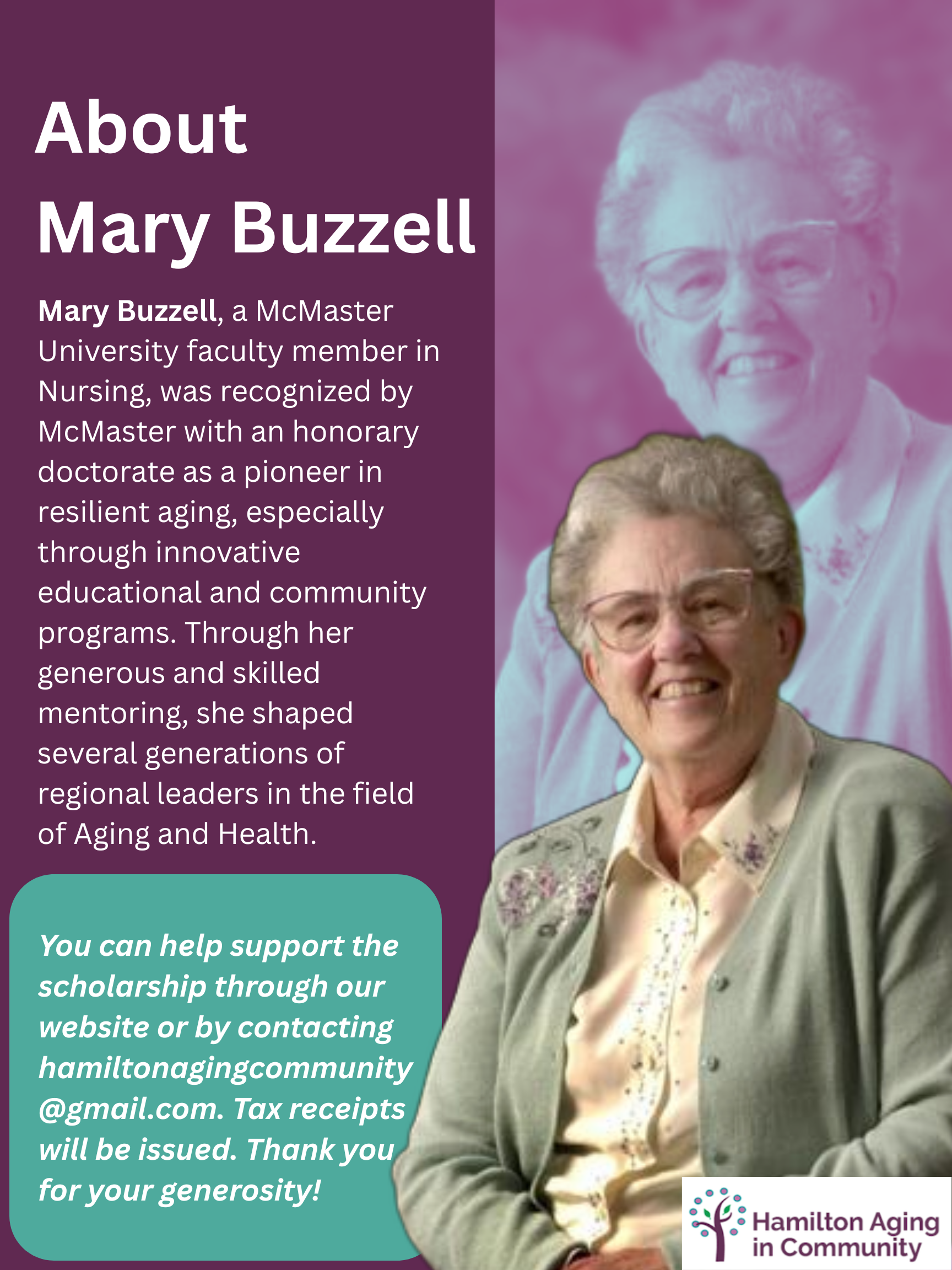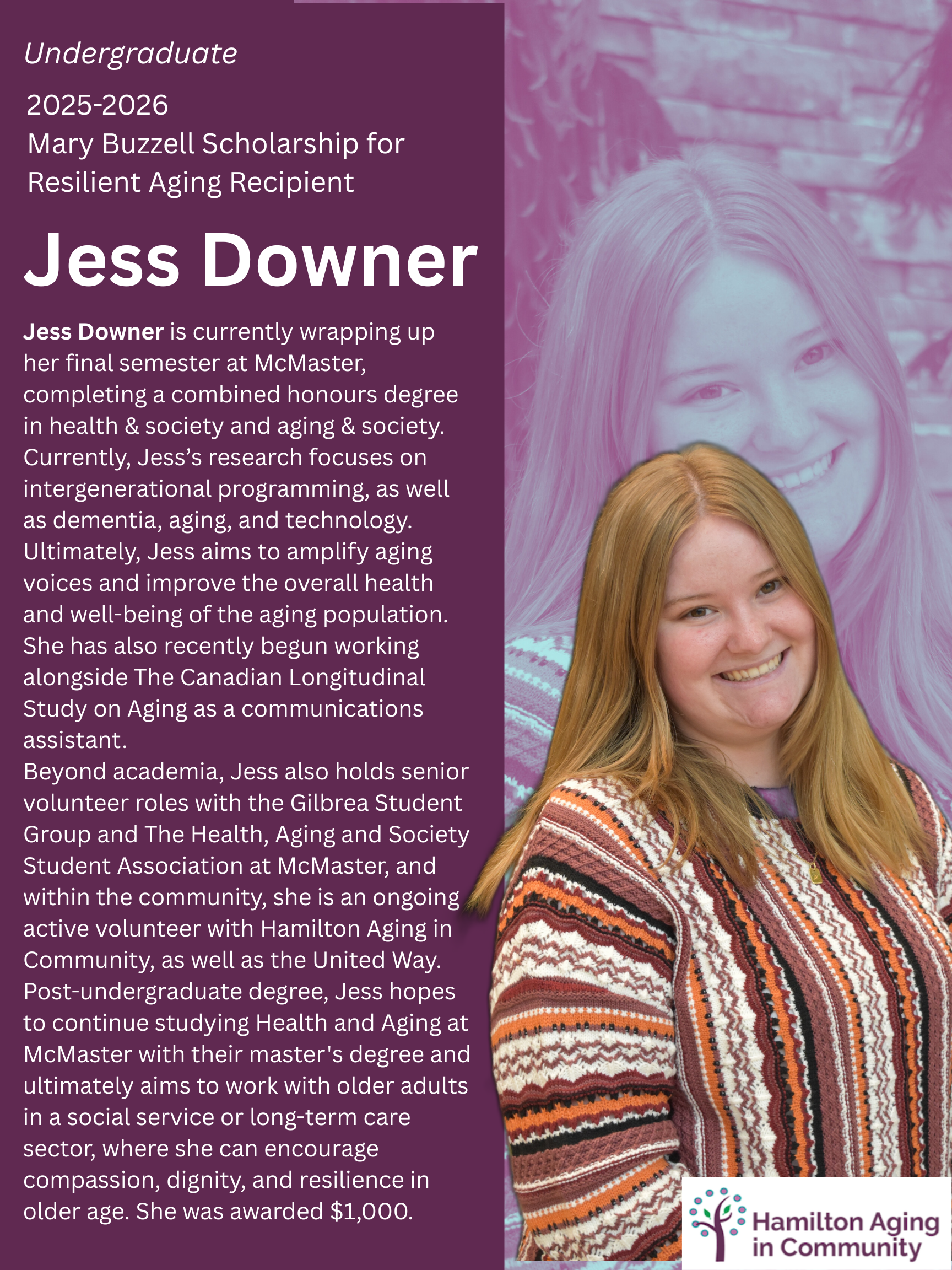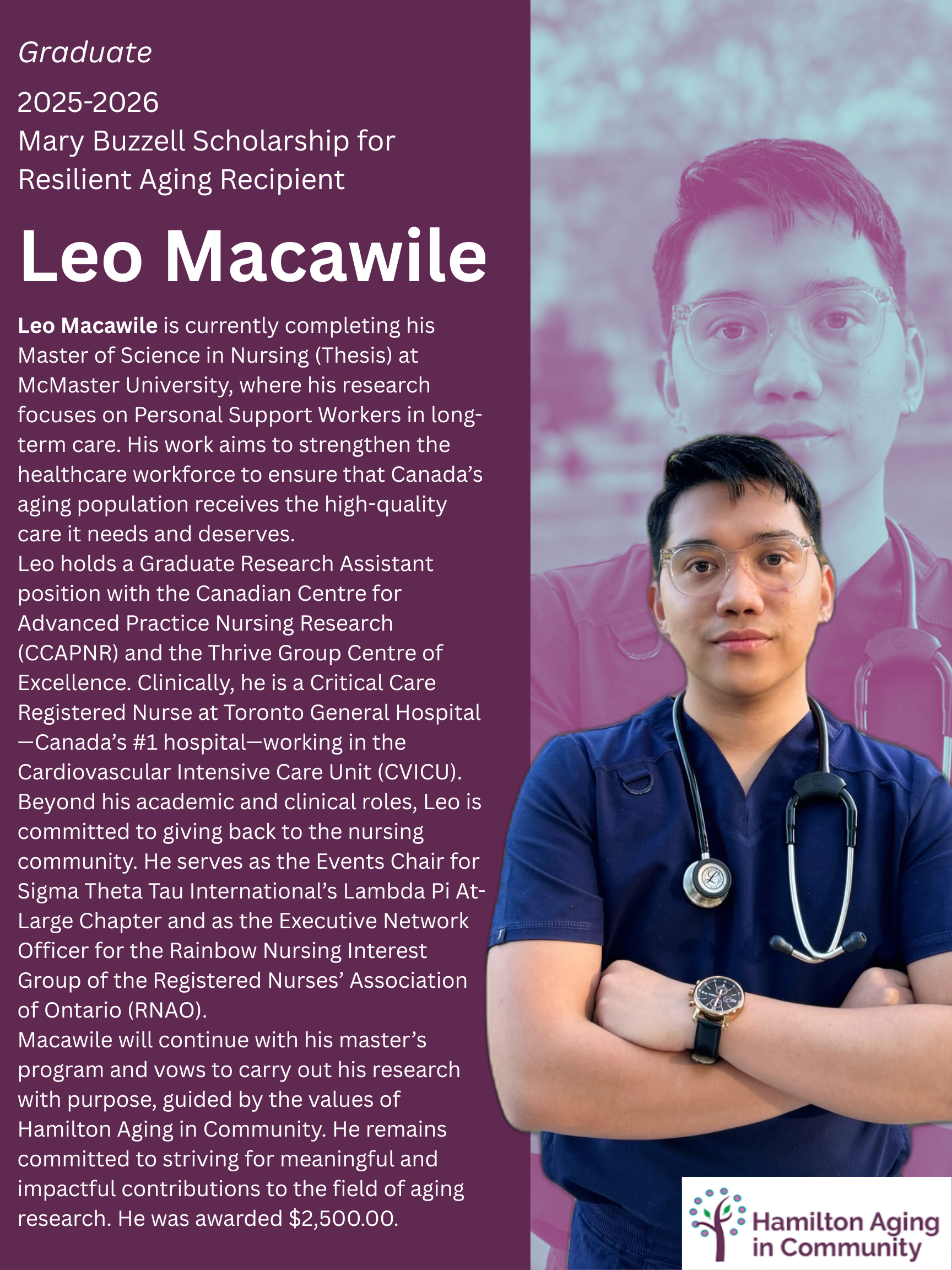The Mary Buzzell Scholarship in Resilient Aging will be available to students enrolled in degree programs at McMaster University.
The undergraduate scholarship will be awarded to a student enrolled in the Honours Aging and Society Program.
The graduate scholarship will be awarded to a student enrolled in a Masters degree program in any Faculty of the University.
To make a donation to support these annual scholarships, CLICK HERE, and indicate in the message box “For Mary Buzzell Scholarships”.
MARY BUZZELL SCHOLARSHIP IN RESILIENT AGING
The Mary Buzzell Scholarship in Resilient Aging will be available to students enrolled in degree programs at McMaster University. See below for information about the undergraduate and Master’s level scholarships.



UNDERGRADUATE APPLICATION AND TIMELINE
Mary Buzzell Undergraduate Scholarship for Resilient Aging
Deadline Date: November 1, 2026
Amount: Annual award of $1,000.
Notification of Award: December 1, 2026
The Mary Buzzell Undergraduate Scholarship for Resilient Aging will be awarded to an outstanding student enrolled in fourth year Aging Studies and/or Health Studies in the Department of Health, Aging & Society at McMaster University and who is preparing for a career in the multidisciplinary field of Aging.
Candidates should be enrolled as a full-time student.
About Hamilton Aging in Community, the sponsoring organization:
Hamilton Aging in Community is a charitable organization intended to relieve social isolation among maturing adults and seniors. HAC promotes resilient aging in community by disseminating information, enhancing lifelong learning, cultivating mutual support, facilitating opportunities for older adults to contribute, and fostering intergenerational engagement.
The Mary Buzzell Undergraduate Scholarship for Resilient Aging reflects these aims by encouraging Honours undergraduate students at a crucial stage in their Aging-related career.
About Mary Buzzell
Mary Buzzell, a McMaster University faculty member in Nursing, was recognized by McMaster with an honorary doctorate as a pioneer in resilient aging, especially through innovative educational and community programs. Through her generous and skilled mentoring, she shaped several generations of regional leaders in the field of Aging and Health.
How to Apply
Please Submit
Submit all these documents to:
Dr. Ellen Ryan ([email protected]).
Please use this Subject Heading:
Mary Buzzell Undergraduate Scholarship Application.
For more information or with questions, please send email to Ellen Ryan ([email protected]) and see Hamilton Aging In Community website.
MASTERS-LEVEL APPLICATION AND TIMELINE
Mary Buzzell Graduate Scholarship for Resilient Aging
Sponsored by Hamilton Aging in Community, the Mary Buzzell Graduate Scholarship for Resilient Aging will be awarded to an outstanding student enrolled in any Master’s Degree program at McMaster University who is preparing for a career in the multidisciplinary field of Aging.
Deadline Date: November 1, 2026
Notification of Award : December 1, 2026
Annual Amount: $2,500.
The Mary Buzzell Graduate Scholarship for Resilient Aging will be awarded to an outstanding student enrolled in any Master’s Degree program at McMaster University who is preparing for a career in the multidisciplinary field of Aging.
About Hamilton Aging in Community
Hamilton Aging in Community is a charitable organization intended to relieve social isolation among maturing adults and seniors. HAC promotes resilient aging in community by disseminating information, enhancing lifelong learning, cultivating mutual support, facilitating opportunities for older adults to contribute, and fostering intergenerational engagement.
The Mary Buzzell Graduate Scholarship for Resilient Aging reflects these aims by encouraging Master’s students at a crucial stage in their Aging-related career.
Eligibility
The Mary Buzzell Graduate Scholarship for Resilient Aging will be awarded to an outstanding student enrolled in any Master’s Degree program at McMaster University who is preparing for a career in the multidisciplinary field of Aging.
About Mary Buzzell
Mary Buzzell, a McMaster University faculty member in Nursing, was recognized by McMaster with an honorary doctorate as a pioneer in resilient aging, especially through innovative educational and community programs. Through her generous and skilled mentoring, she shaped several generations of regional leaders in the field of Aging and Health.
How to Apply
Please Submit
- Letter (300-500 words) demonstrating ongoing commitment to resilient aging through applicant’s academic background, student projects and research, volunteer and paid-work involvements, and future goals.
- Resumé (1 or 2 pages), undergraduate transcript, and McMaster graduate transcript.
- Letter of reference from faculty supervisor.
Conditions
The name, department, degree, and year of the successful applicant will be made public through HAC communication channels (e.g., newsletters, website, social media platforms, etc.). Successful applicants may be asked to make a presentation at an event hosted by Hamilton Aging in Community during the current or following academic year.
For more information, contact Dr. Ellen Ryan via email at [email protected] and see Hamilton Aging In Community website.
TRIBUTE TO MARY BUZZELL
Mary Buzzell:
Leader, Mentor, Teacher, Advocate, Friend
Dr. Mary Buzzell (1933-2023) was a leader, prolific writer, teacher, mentor, speaker and advocate. She participated in numerous organizations, as a nursing professional and/or as a volunteer. Mary Buzzell’s career represents a superb synthesis of education, scholarship, service and humanitarianism. During her life, Mary also received several awards for her extensive contributions. For example, In 2001, Mary was awarded an Honorary Doctor of Laws by McMaster University and in 2012, she was awarded the Queen’s Golden Jubilee Medal by the Canadian Association on Gerontology for her incredible contributions to the community and her work with VON (Victorian Order of Nurses).
Mary was a leader in the field of nursing, gerontology, and adult education with a focus on ‘personhood, lifecare and community-based care’. She was a faculty member in the Department of Nursing at McMaster University. Under her leadership, the first Nurse Practitioner program in Ontario was initiated. She frequently facilitated workshops at McMaster for health and social service professionals as well as consulted and taught nationally and internationally. Mary was proud of her international work as Nursing Consultant to The Aga Khan Health Services in Kenya, Pakistan and Uganda. She also worked and taught in Australia, Sweden and Thailand.
Her focus on personhood — treating the whole person rather than just the symptoms of their illnesses – became her mantra. Janis North, VON colleague and friend, shared that “early in my career, I had the privilege to listen to Mary and her colleague Mary Gibbon lead several discussions on ethics. A key ‘takeaway’ was: “We may think that we may know what is best for a person’s health, but we are arrogant if we assume that we know what is best for a person’s life”. Mary urged us to help people facing challenging health issues to find their voice so they could determine how to make choices in a way that respected their lives, and she showed us how to do it. Many practitioners remember Mary telling them to be detectives and try to find out the reasons that underlie behaviours.
Mary applied her educational expertise in the development of a variety of educational packages including both print and audiovisual resources. She is the central speaker in the teaching resource “Promoting the Concept of Personhood in Practice”, which was developed by Gilbrea Centre for Studies of Aging (formerly known as McMaster Centre for Gerontological Studies). “In her continuing determination to get her message across about the importance of personhood, one year, Mary arrived at the Annual Summer Institute workshop with a cardboard tombstone and on it was printed, ‘Assessed to Death, Never known as a person’, recalled Anju Joshi, Mary’s colleague and friend. Mary was also a master storyteller. “I really began using stories to teach concepts because Mary taught me how to do that effectively”, reflected Anju.
Mary taught many people how to advocate through education. She would gather and encourage colleagues to meet with local and provincial government representatives to update them on issues facing vulnerable people in the community. She frequently wrote a regular column in local community newspapers informing older adults about current issues, especially related to home care. She often felt that the health care system was ‘missing the boat’ by being problem-oriented in its focus without giving weight to people’s strengths. Mary was also known to befriend journalists and enlist their support to inform the public about key issues.
While at McMaster, Mary held a joint appointment as Nursing Consultant with VON Hamilton, becoming their Director of Community Relations after she retired from McMaster. Ellen Ryan, McMaster colleague and friend, said ,“I remember that the two Marys – Mary Gibbon and Mary B – toured Canada for VON in the early 80’s to spread the word that the aging boom was coming around the turn of the millennium and that Canada better prepare for this by creating the appropriate community, housing, and health care supports. They were early messengers, even predicting that we would someday see seniors among the homeless – as we do now”.
Mary was instrumental in the development of VON`s Palliative Care Nursing Team and the Caregiver Education Program at VON. Mary coached staff in understanding the impact of suffering and powerlessness for people living with long-term or life-ending health challenges.
Anne Vallentin, former nursing student, friend and colleague, noted that “the most important part of my career was learning what Mary Buzzell and Mary Gibbon had pioneered, as retired ‘renegade volunteers’, an educational series for family/informal caregivers. “The two Mary’s were aware of the body of knowledge about the serious health consequences faced by caregivers due to stress, isolation and exhaustion. Through Mary B’s adult education background and her lived experience of seven years of caring for her frail, elderly mother, and Mary G’s intrepid spirit, they teamed up to offer a four-week series “Survive and Thrive”. Caregivers don’t have a lot of time, so the information, that could be lifesaving, had to be distilled into pearls of wisdom, practicality and fun. With Mary’s help and coaching, Anne was later hired by VON to take this pioneering work and turn it into a format that could be replicated and receive ongoing funding. The series, renamed “From Stress to Strength”, has been offered in the Hamilton community by VON since the early 2000’s.
Mary was an ace at asking meaningful questions in large group settings or in conversation with one person. “What makes you feel the most like yourself” or “What gives you hope”? were questions she encouraged people to ask. Janis North recalls, “Mary was a masterful teacher; she never used more words than necessary; she always could make the complex simple; she didn’t overwhelm and she always, always, always encouraged”. Often, one of her insightful and wonderful questions would make people really think about their life and direction.
She enjoyed having lunch, especially dessert, with her many friends. Lunches were never about her, she cared deeply for her friends, always asking questions and showing concern about their daily lives and family. Ellen Ryan remembers that “There was no free lunch with Mary. She was famous for taking aging and health professionals to lunch periodically. I learned the hard way that she would ask questions about your goals at one lunch and then expect you to comment on your progress at the next. At the second lunch, when I had forgotten what I’d said at my first lunch, Mary recited my goals back to me. I knew then to keep track of my conversations with her and to have a progress report ready. And so I grew into my own aspirations”. Mary was the ultimate mentor.
Mary had contacts and friendships around the globe and was so good at connecting and inviting people into her expansive circle. What Mary Buzzell taught can be summed up in the HOPE acronym that she developed: Helping each Other ExPlore Every possibility to move forward to achieve personal goals. It is an honour for so many to be able to say, “My friend, Mary Buzzell”.
